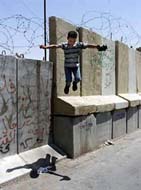
Always compliant when it comes to its close chum in the Middle East, the United States expressed its displeasure this week with Israel’s planned route for its so-called security wall with a typically pro-Israeli response. It did not threaten Israel. It threatened to threaten.
For the second time, President Bush called the wall a “problem” on Wednesday, and Colin Powell echoed the sentiment, using the same term. Putting it even more plainly, Powell branded the wall a danger to the road map because “it starts to infringe and take over Palestinian land,” a point clear to anyone who has glanced at a map of the wall’s proposed path. Despite Powell’s – and uncharacteristically Bush’s – clarity of mind on this point, the reproach remained mild. The administration did not announce that it would take immediate action, as it has done so many times in the past in response to what it considers to be Palestinian violations of peace processes. Instead, the State Department announced simply that it would consider cutting promised loan guarantees to Israel equivalent to the amount that Israel will spend on the construction of the wall.
If the threat is fulfilled, it will indeed be a strong statement by the United States against Israel’s wall policy, which by virtue of its deep indentations into Palestinian territory, intends to effectively annex 55 percent of Palestinian land, entrapping 500,000 Palestinians in the process. In the construction of the first stage of the wall, alone, 67 villages have been separated from their center of life, 2,800 acres of land have been confiscated, 83,000 olive trees have been uprooted, 30 wells have been confiscated, and 35,000 meters of water infrastructure have been destroyed. But as it stands, the American threat to threaten is nothing more than a warning, leaving plenty of time and space for an Israeli response before any certain action is taken. Politically astute about its “master-obeyer” relationship with the United States (a relationship in which Israel is not, by the way, always relegated to “obeyer” status), Israel has responded swiftly, saying it will halt controversial construction of the wall until a compromise between the two bosom allies is reached.
Israel additionally took this opportunity to remind the world that it is not the purpose of the wall to which the United States objects. Vigorously fighting the so-called “war on terror” on all possible fronts, the United States maintains its stated commitment to security at all costs, which faithfully aligns with Israel’s purported purpose in the construction of the wall.
On the flip side, Powell’s assessment of Palestinian commitment to the road map reveals something different. He remarked that the one-month-plus ceasefire has been responsible for the a “significant” decrease in violence, yet in the same breath: "We need to see a more concerted effort against the capacity for terrorist activity on the Palestinian side” and “It's not enough just to have a cease-fire." At the same time, Israel released a paltry 334 Palestinian prisoners (paltry as compared to the 6,000 still imprisoned, many without charge). Yet in the face of such a limited gesture there is no American admonition. America’s capacity to pressure Israel remains only as effective as its intention.






